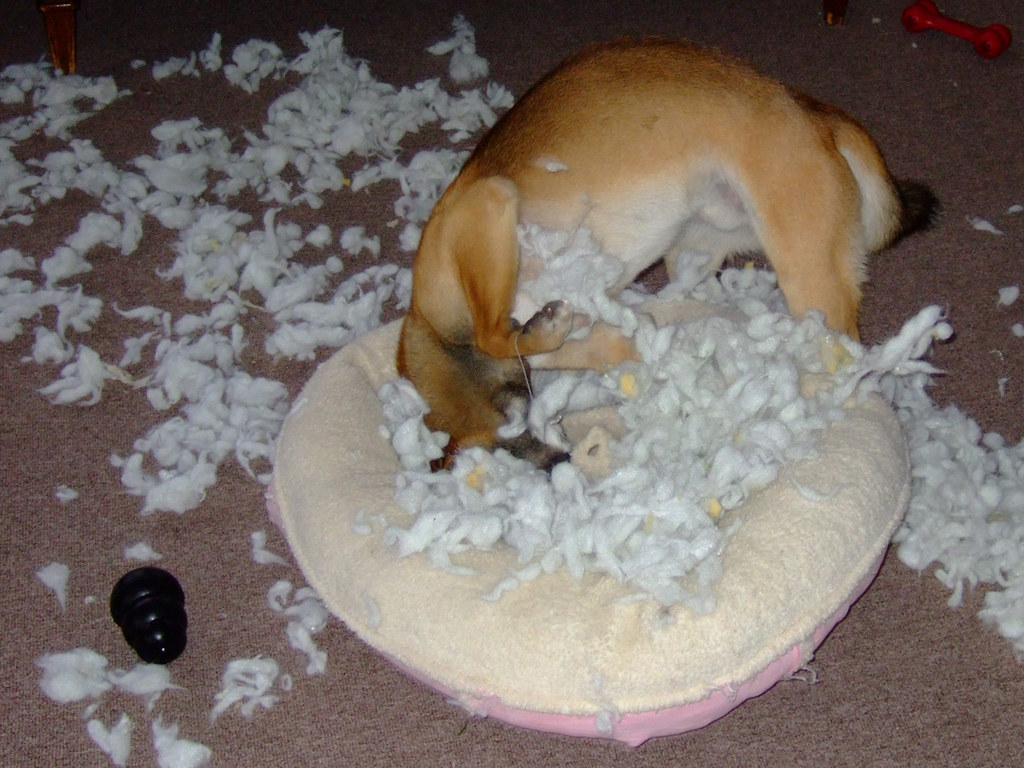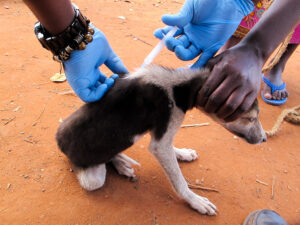Why Do Dogs Dig On Beds And Couches

Reasons Why Do Dogs Dig On Beds And Couches
Why do dogs dig on beds and couches have you ever pondered over the peculiar penchant your pooch has for digging into your bed or couch? It’s an adorable yet enigmatic behavior that often leaves pet owners scratching their heads. But fear not, in this article, we’re delving into the depths of why dogs do this. Get ready to unearth the secrets behind your furry friend’s digging tendencies and forge an even stronger bond with your beloved companion. Let’s embark on this journey together and decode the mystery behind their adorable antics!
Why Do Dogs Dig On Beds And Couches?
Ever stumbled upon your furry friend gleefully wrecking your furniture and found yourself pondering, as a conscientious pet parent, what could possibly drive such behavior?
Well, buckle up because we’ve curated a list of the motivations driving your dog’s penchant for digging on furniture.

1. Natural instincts
Diving into the roots of your dog’s digging instincts reveals a tale as old as time. Their wild ancestors, guided by survival instincts, dug dens for safety, comfort, and sometimes to unearth prey. Despite domestication, this primal urge persists within our canine companions. While modern-day dogs may not rely on it for survival, the instinct remains deeply ingrained. Unable to suppress this innate drive, your backyard might just undergo a transformation, and indoors, your sofa or bed unwittingly becomes a canvas for their digging endeavors. Recognizing and appreciating this natural behavior equips us to coexist harmoniously with our beloved pets, safeguarding both our furniture and our bond with them.
2. Breeds
Unveiling the genetic blueprints of certain dog breeds such as Dachshunds, Airedale Terriers, Alaskan Malamutes, Cairn Terriers, Fox Terriers, Jack Russell Terriers, and Siberian Huskies sheds light on their innate proclivity for digging. Bred with a purpose, these breeds honed their digging skills to unearth small prey, a trait deeply embedded in their DNA. For majestic breeds like Huskies and Malamutes, digging serves as more than just a pastime; it’s a survival strategy to navigate extreme climates, fashioning cozy shelters for insulation or crafting dens for protection. By comprehending these breed-specific inclinations, pet owners gain a deeper appreciation for their dogs’ intrinsic instincts, empowering them to effectively manage and channel their digging tendencies.
3. Marking their territory
While most dog owners are familiar with the concept of marking territory through urination, there’s another subtle yet effective method our furry friends employ. Dogs possess scent-producing sweat glands in their paws, and when they dig, they inadvertently leave behind their unique scent signature, akin to planting a flag on conquered territory. So, when your canine companion indulges in a digging spree on your sofa or bed, they’re not merely engaging in playful antics; they’re staking their claim, ensuring that everyone knows that particular spot belongs exclusively to them.
4. Nesting behavior Is your dog about to have puppies ?
If you notice your furry friend diligently digging at its bedding, it could be gearing up to welcome a new generation of pups into the world. Female dogs possess a primal instinct to create a safe and snug environment for their offspring, reminiscent of the cozy dens in the wild. Without a designated area, such as a dog bed, your sofa might inadvertently become the chosen locale for this maternal nesting ritual. So, the next time you catch your canine companion excavating the cushions, remember, it could be their way of meticulously preparing a comfortable and secure haven for the impending arrival of their precious puppies.
5. Food or toys
Ever caught your dog fervently digging into the sofa cushions? One plausible explanation is their innate belief that there’s a hidden treasure waiting to be unearthed. Whether it’s a long-lost toy, tantalizing food crumbs, or any other intriguing discovery, their digging escapades are akin to an adventurous quest for the unknown. So, the next time you witness your furry friend excavating the sofa, rest assured, they’re simply indulging in their natural curiosity, hunting for hidden gems, or perhaps stashing away a cherished possession for a rainy day.
6. Emotional distress
For certain dogs, digging serves as a coping mechanism in times of stress, fear, or boredom. When left alone for extended periods, dogs can experience separation anxiety, fearing abandonment by their pack. This emotional turmoil may manifest in destructive behaviors like excessive digging. It’s crucial to rule out any underlying medical issues by consulting a vet if your dog’s digging becomes problematic. The frenetic digging on your sofa may stem from emotional distress, with the tearing sounds and flying stuffing oddly satisfying to your pet, reminiscent of capturing prey. This burst of activity serves as an outlet for their boredom and anxiety, known as displacement behavior. Understanding the root cause of your dog’s stress can help address these behaviors, fostering a more comfortable environment for your beloved companion.
7. Comfort
Much like humans fluffing pillows and adjusting blankets for optimal comfort, dogs have their own bedtime rituals to create the perfect nap environment. Before settling down, they meticulously rearrange their sleeping area, often incorporating a few spins for good measure, until satisfied with their handiwork. It’s their version of creating a snug and cozy spot tailored to their liking. So, the next time you catch your furry friend digging before bedtime, know that it’s not a random act but rather their way of ensuring that their nap spot is just right for a peaceful slumber why do dogs dig on beds and couches.

How Do You Stop Dogs From Digging Into Furniture ?
Dogs have an innate instinct to dig, and trying to suppress it entirely is like trying to hold back a river. However, as pet parents, we can channel this natural behavior towards less destructive outlets.
1.No furniture
Steer clear of the sofa to prevent your dog from turning it into their personal excavation site! Consistently reinforce this boundary through training, offering patience as your furry friend adapts to the new rules. Safeguard your furniture by employing pet-friendly covers, deterring digging with unpleasant scents, and diligently removing any enticing debris stuck between cushions. By establishing and upholding these guidelines, you not only safeguard your furniture but also foster positive behavior in your beloved companion, cultivating a harmonious and joyful living environment for both of you.
2. Training
To tackle the challenge of your dog hopping onto the sofa, employing the ‘Off’ command during training sessions proves highly effective. Additionally, utilizing a leash to interrupt digging and redirect their focus to alternative activities can be beneficial. Don’t forget to lavish praise upon them for exhibiting desired behaviors. Crate training serves as a valuable tool, particularly in situations where supervision isn’t possible, making it especially advantageous for training puppies. By integrating these training methods into your routine, you can steer your dog toward positive behaviors, nurturing a well-mannered and contented companion why do dogs dig on beds and couches.
3. Groom your dog
Regular nail trimming is key to minimizing potential damage caused by your dog’s digging escapades. Short, blunt nails are less likely to wreak havoc, particularly on delicate surfaces like the sofa. By staying proactive with nail care, you not only safeguard your furniture but also ensure your furry friend remains comfortable and your belongings remain in tip-top condition.
4. Upgrade your dog’s bed
If your dog has a penchant for digging, particularly larger breeds notorious for their digging prowess, a flimsy dog bed might not withstand the assault, leaving your sofa as an irresistible alternative. Investing in a durable, well-made dog bed designed to withstand digging can help deter this behavior and safeguard your furniture. A top-notch bed not only provides comfort but also encourages your furry friend to choose it over the sofa for a good night’s sleep, promoting overall happiness. If you have a pregnant dog, offering a designated box filled with soft blankets allows her to create a cozy nest for herself and her future pups. This thoughtful upgrade in bedding caters to your dog’s natural instincts, providing a secure and comfortable space for relaxation.

5. Take care of your dog’s emotional well-being
While addressing your dog’s emotional well-being may seem daunting, there are actionable steps you can take to support them. If your busy schedule keeps you away from home, consider enlisting the help of a pet daycare or sitter to provide companionship and stimulation. Dogs thrive on social interaction, so ensuring they have opportunities to engage with others can make a significant difference. Incorporate regular walks, play sessions, and mental challenges into their routine to keep their minds sharp and their energy levels in check. Introducing games, toys, and agility courses taps into their intelligence and provides much-needed mental stimulation. Designate a specific area, such as a backyard space or a box filled with rags, where your dog can freely indulge their digging instincts. Additionally, adopting another dog can offer companionship and alleviate any feelings of loneliness that may be contributing to their digging behavior why do dogs dig on beds and couches.
Final Words!
Today, we delved into the intriguing world of our furry companions’ penchant for digging on our beds and couches. Through our exploration, we’ve unearthed a multifaceted understanding of this behavior, realizing that it stems from deep-seated instincts, emotional needs, and a quest for comfort. While we may not eradicate this innate inclination entirely, we’ve uncovered strategies to redirect and manage it effectively. From acknowledging their instinctual drives to implementing grooming practices and upgrading their bedding, there are myriad ways to nurture a harmonious relationship with our canine companions. So, the next time your dog engages in this quirky behavior, view it as a form of communication, a quest for solace, or an expression of emotions. Embracing these insights allows us to forge deeper connections and cultivate enriched bonds with our beloved furry friends.




